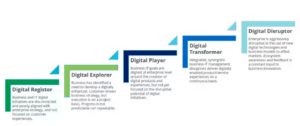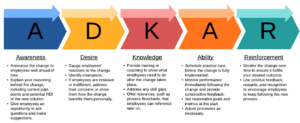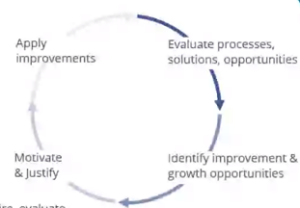Congratulations. In the post-COVID world you have decided to be proactive and look at changing the business to operate successfully in the new normal. And that means embracing the digital solution provided by an ERP system.
But hold up just a second – once your company has selected an ERP system you don’t just install it and expect everything to work out. The business has to make the necessary changes to ensure it succeeds and delivers value.
ERP is an umbrella term for software that helps to manage accounts, resources, finances, inventories, and manufacturing in one unified system rather than separate applications. It also enables you to manage customers and suppliers, and collaborate with them, using a single platform.
Begin with the end in mind
You need to know upfront what level digital maturity you want to achieve. That requires introspection about the areas of the business that need to change to reach the level required.
Apart from the system itself, which you have already decided on, there are the business processes and the organizational structure which may require changes. The Dimensions of Change model can help you evaluate what needs to be done, and where, to reach the required level of digital maturity.

Once you know the level of digital business you want to achieve, and what you need to do to get there, you need to adopt an established methodology to guide you on how you implement the ERP system. A sound project methodology will comprise five steps.
- Project initiation that clearly identifies the scope, resources, processes and management involvement that the project needs.
- A design phase where the business objectives are explored and the ERP application is designed to meet the objectives.
- A build or engineer phase where the solution designed and agreed upon is built and configured.
- With the solution build and accepted, the next phase is go-live where the final steps of data import, training and cut-over to the new system occurs.
- Final handover is where the project closes and the business can start to leverage the value of the ERP system.
Put first things first
In many cases, ERP projects go through several phases stretching over some months. In the first phase, you prioritize the most important business processes and structures.
In your pre-ERP period, there may have been process ambiguity in the company – staff across different functions would have been performing the same task in different ways. With the ERP system, you will be able to standardize processes to deliver high-quality, consistent products and services with a high degree of predictability. This will minimize errors, duplication and variability while also improving efficiency.
Other processes and structures can be addressed in subsequent phases.
Seek to understand then be understood
An ERP implementation is a business-wide endeavor – it is not just an IT project – and its impact is not just confined to one function. A key element of project success is a degree of trust and commitment in the project throughout the company, and this requires managing changes that staff must go through. Regardless of how “ready” executives believe employees to be, this is not an area that should be deemed unnecessary or shut short.
The prerequisite for implementing change is people’s knowledge and appreciation of the need for change. Change management goes through a sequence of steps because it is an educational process of moving staff to a new level of knowledge, understanding and skill.

Keep improving
Just because the implementation part of the project has been completed, does not mean that it is over. Once the ERP system is operational, follow up with a review to see where things can be improved.
This review process is recursive. From an initial baseline, evaluate and identify where improvements can be made, make the improvements and establish a new baseline. Then start again. This is the concept of kaizen – continuous incremental improvement.

A successful ERP implementation will provide the foundation on which your business can improve the efficiency of operations, compete in a world that is rapidly digitizing, and launch new business models. For the implementation to succeed, you need a proven project methodology, accompanied by people with experience and skill in ERP projects, to help you to transform your business.






